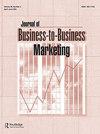Are Business-to-Business Employees More Engaged or Burned Out amid A Global Health Crisis: A Comparative Study
IF 2.5
4区 管理学
Q3 BUSINESS
引用次数: 8
Abstract
ABSTRACT Purpose The most recent health crisis, COVID-19, has been the greatest disruptor to society in centuries. This disruption has significantly impacted how business-to-business organizations conduct business. These disruptions may create changes in work-related attitudes and perceptions for business-to-business employees. However, due to the recency of the pandemic, there is a lack of published comparison studies on employee attitudes and perceptions. Specifically, the overarching research question in this study investigates if differences between pre-pandemic and mid-pandemic exist for ten work-related attitudes and perceptions. Methodology/approach Quantitative survey data using a Qualtrics panel was collected from currently employed business-to-business salespeople from two different time periods. The first survey of three hundred sixty-one participants was completed pre-pandemic (2018) while the second survey of three hundred five participants was completed mid-pandemic (late-2020). All measures were taken from the extant literature using a seven-point scale. Findings Overall, out of ten constructs investigated, five significant differences were identified. Results found that employees mid-pandemic experienced higher levels of organizational support and personal accomplishment than employees pre-pandemic. These employees experienced lower levels of work-family conflict, emotional exhaustion, and turnover intentions mid-pandemic compared to pre-pandemic. No statistically significant differences existed between pre-pandemic and mid-pandemic employees’ attitudes and behaviors for supervisory support, engagement, depersonalization, job satisfaction, and organizational commitment. Contribution of the article This is the first study that has compared the impact of a global health crisis on business-to-business salespeople’s job-related attitudes and behaviors. This study is important because it highlights the impact that a health crisis can have on employees within the organization. In a time of great negativity and uncertainty, these results showcase how a pandemic may have also positively impacted organizations, especially as it relates to the sudden adoption of new technologies. For sales organizations, we provide guidance on ways organizations can be successful post-pandemic.在全球健康危机中,企业对企业员工是更投入还是更倦怠:一项比较研究
摘要目的最近的健康危机新冠肺炎是几个世纪以来对社会的最大干扰。这种中断严重影响了企业对企业组织开展业务的方式。这些干扰可能会改变企业对企业员工与工作相关的态度和看法。然而,由于疫情的近期,缺乏关于员工态度和看法的已发表比较研究。具体而言,本研究的首要研究问题是调查疫情前和疫情中期是否存在十种与工作相关的态度和看法的差异。方法/方法使用Qualtrics小组从两个不同时期的现有企业对企业销售人员中收集定量调查数据。对361名参与者的第一次调查是在疫情前(2018年)完成的,而对305名参与者的第二次调查则是在疫情中期(2020年末)完成的。所有的测量都是从现存的文献中采用七分制进行的。研究结果总体而言,在调查的10个构建体中,发现了5个显著差异。结果发现,疫情中期的员工比疫情前的员工获得了更高水平的组织支持和个人成就。与疫情前相比,这些员工在疫情中期经历的工作与家庭冲突、情绪衰竭和离职意向水平较低。疫情前和疫情中期员工对监督支持、敬业度、去个性化、工作满意度和组织承诺的态度和行为之间没有统计学上的显著差异。这是第一项将全球健康危机对企业的影响与企业销售人员的工作态度和行为进行比较的研究。这项研究很重要,因为它强调了健康危机对组织内员工的影响。在一个充满消极和不确定性的时代,这些结果表明,疫情可能也对组织产生了积极影响,尤其是与新技术的突然采用有关。对于销售组织,我们为组织在疫情后取得成功提供指导。
本文章由计算机程序翻译,如有差异,请以英文原文为准。
求助全文
约1分钟内获得全文
求助全文
来源期刊
CiteScore
2.20
自引率
35.70%
发文量
22
期刊介绍:
The Journal of Business-to-Business Marketing® encourages diversity in approaches to business marketing theory development, research methods, and managerial problem solving. An editorial board comprised of outstanding, internationally recognized scholars and practitioners ensures that the journal maintains impeccable standards of relevance and rigorous scholarship. The Journal of Business-to-Business Marketing features: •basic and applied research that reflects current business marketing theory, methodology, and practice •articles from leading researchers covering topics of mutual interest for the business and academic communities

 求助内容:
求助内容: 应助结果提醒方式:
应助结果提醒方式:


